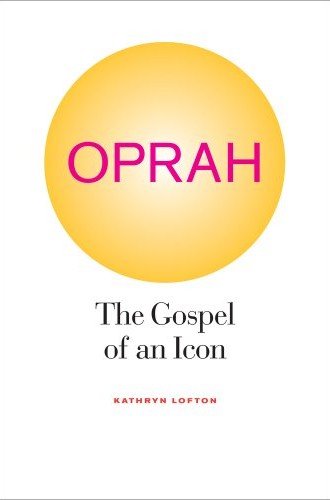Oprah, by Kathryn Lofton
Until I read Oprah: The Gospel of an Icon, I would not have said that I was a connoisseur of the world of O. My contact with Oprah has been limited to watching a few episodes of her show in the early 2000s and occasionally glancing through her magazine while at a friend's house. But the eerie feeling I had while reading Kathryn Lofton's account of the TV maven is that I have been breathing Oprah's reality, vocabulary, consumer choices and worldview in the cultural air all around me. I have not been immune to the Gospel of Oprah, and the fact that her influence on me has been unrecognized makes it no less profound.
I admit that I am dismayed by this new knowledge. Oprah, in Lofton's terms, represents the state of contemporary spirituality: the spirit of consumer goods. All roads, no matter how spiritual, lead back to buying more stuff. Oprah is both pitchwoman and preacher of this worldview—two roles that are indistinguishable. Oprah helps her audience find the choices that will help them to live their "best life"—spiritually, economically, physically and emotionally. She does this by selling her own taste as a commodity. This is a carefully crafted and cultivated taste—one that will always sell to the widest possible audience. Oprah, in Lofton's account, is a unifying, syncretistic force that draws together various cultural dimensions and then gives them her personal stamp. She encourages her viewers to do the same, collecting whatever products, ideas or beliefs will suit their ideal existence. Oprah makes her own choices into a spectacle so others can sift more easily through the unrelenting parade of contemporary ideas and products.
In 2003, Lofton reports, Oprah reopened her long-standing book club. Her choice for the relaunching was John Steinbeck's East of Eden. The episode in which this choice is announced includes a giddy tour of Chicago in a bookmobile, during which Oprah drops off gift-wrapped copies of the book to surprised viewers and delivers sales pitches for the swimsuits that viewers might wear while reading. ("Gotta look cute when you're reading," Oprah says before going to a commercial break.) Oprah ends the episode by urging her viewers to "go right out and get yourself a copy" of the new book, then adds as if spontaneously, "You know I love that little Chrysler truck"—referring to the vehicle she had used as a bookmobile. "Ever since Celine Dion had her baby in the Chrysler. . . . Let me get a Chrysler truck. Thank you so much. Thanks, everybody."





